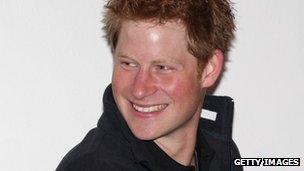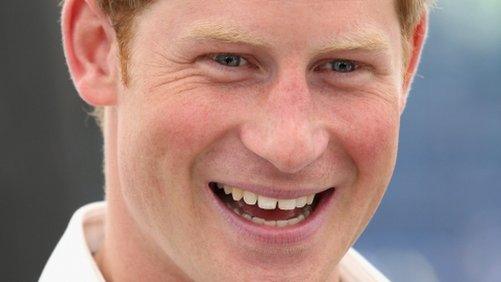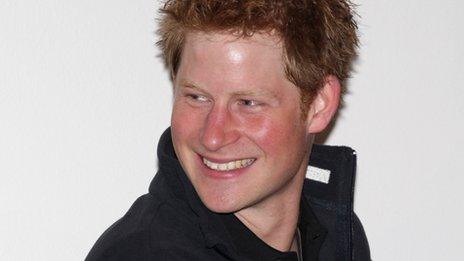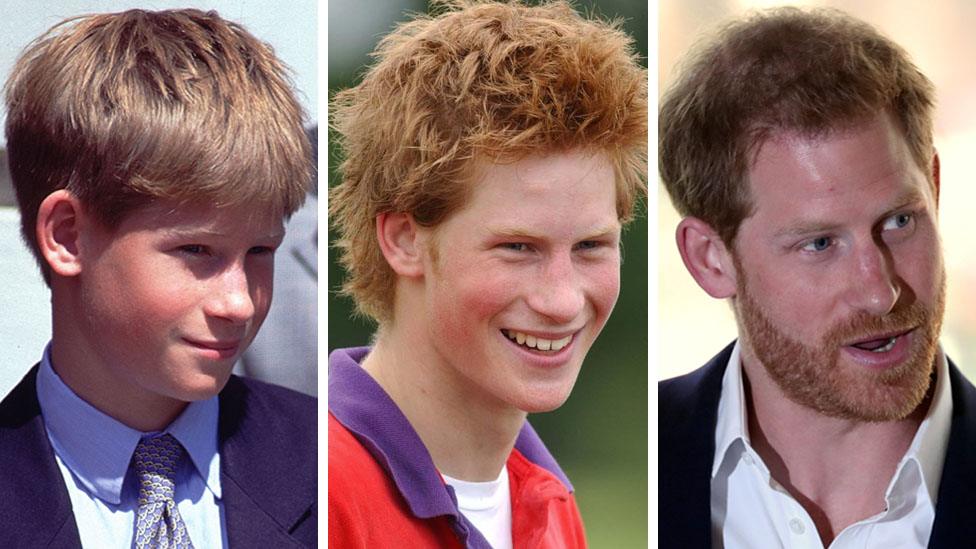Reaction: Sun publishes Prince Harry naked photos
- Published
The Sun has become the first British newspaper to publish the photos of a naked Prince Harry taken in Las Vegas. This was despite warnings from the Royal Family's lawyers that it would be an invasion of his privacy. Here is some of the reaction to the decision and the issues the photos have raised.
The Sun
"There is a clear public interest in publishing the Harry pictures, in order for the debate around them to be fully informed. The photos have potential implications for the prince's image representing Britain around the world. There are questions over his security during the Las Vegas holiday. Questions as to whether his position in the Army might be affected.
"Further, we believe Harry has compromised his own privacy. These are not pictures of him and a girlfriend at Balmoral. The prince was in Vegas, the party capital of a country with strong freedom-of-speech laws, frolicking in the pool before inviting strangers to his hotel room for a game of strip billiards. These are hardly the acts of a man jealously guarding his privacy."
St James's Palace

"We have made our views on Prince Harry's privacy known. Newspapers regulate themselves, so the publication of the photographs is ultimately a decision for editors to make.
"We have no further comment to make either on the publication of the photographs or on the story itself concerning Prince Harry's private holiday in Las Vegas."
Kelvin MacKenzie, former Sun editor
"Fortunately America is known as the land of the free, which is the opposite position of the UK where you're starting to get prime ministers like Cameron wheeling out judges like Leveson, and Parliament, who want to gang up exclusively on newspapers in the UK. Whereas, of course, readers in every other part of the world and on every website in the world, including major news organisations like CNN, have been publishing these pictures for the last 36 hours. It really is absolutely shocking."
Paul Connew, former News of the World deputy editor
"A running theme during the Leveson Inquiry, and one of the great dilemmas I think for Lord Justice Leveson as he sits down and writes his report, is the future and the economic viability of newspapers, both broadsheets and popular, in the UK in the age of the web.
"Can you have a scenario where what's available on the web and also being carried by legitimate major organisations like CNN and NBC around the world, and yet it can't be printed in the UK itself? I think that's simply irrational and also illogical, and effectively doesn't fit with the world as it is in the age of the internet and social media."
Mark Stephens, media lawyer
"The law [on Thursday] in this country was that they couldn't publish the pictures, absent some pressing public interest. There is no public interest yesterday and there's no public interest today and there'll be no different public interest tomorrow. So it was illegal yesterday to publish these pictures, it's illegal today to publish them and its illegal tomorrow to publish them. And I think this is just a publicity stunt from the Sun."
Brian Cathcart, director of campaign group Hacked Off
"This is the country's biggest-selling newspaper breaking the industry's own code [of practice] despite clear warnings. It is flagrant proof that our national newspapers are incapable of regulating their own affairs. The Sun's argument that this is about freedom of the press is nonsense. This is about the Sun's right to trample over the industry's own feeble rules when it likes, and also to invade people's privacy whenever it chooses."
John Whittingdale, Commons Culture, Media and Sport Committee chairman
"I'm not sure where the public interest lies in publishing them [the pictures]. The fact that they happened is well known. How the public interest is served by doing this is not clear. I don't at the moment know their reasons for publishing them but I would be concerned if this is more about trying to boost the circulation of their newspapers."
Gerry Sutcliffe, Commons Culture, Media and Sport Committee member
"I think it's a grave mistake. First of all, we need to know, did the Sun pay for any of the pictures, which would be an interest as far as I'm concerned. But I'm just concerned. Yes, people know the pictures are around. This was supposed to be a private situation and clearly it's not. And what is the public interest?"
Don Foster, co-chairman, Liberal Democrat Parliamentary Policy Committee on Culture, Olympics, Media and Sport
"I don't think that there is any public interest justification in showing photographs of an individual that happens to be a member of the Royal Family in a private setting. I can see no justification for that whatsoever.
"I think that the person who's done the most wrong, of course, is the person who broke Prince Harry's trust and sold the photographs."
Lord Prescott, former Deputy Prime Minister
"It is not about privacy. It is about money, money, money. And they know that by exclusively printing the pictures, assuming they are the only paper which does, they will get everybody buying the paper to see this. So they show an utter contempt even for the body [the Press Complaints Commission] they still have some influence in."
Chris Blackhurst, editor of the Independent
"We've taken the decision from the very off that we're not going to publish these pictures. They were taken in a private place, private party, we thought there was an issue of privacy, and that's where we are. He was only doing, let's face it, what a lot of Sun readers do every weekend on stag parties and they don't expect to be on the front page of that morning's paper."
Daily Mirror spokesman
"The Daily Mirror took the decision not to publish the pictures of Prince Harry because we would be in clear breach of the Press Complaints Commission's Editors' Code of Practice, regarding intrusion of privacy, which we signed up to and we stand by that decision."
Gordon Young, editor of the Drum, which says it was the first UK media organisation to publish the pictures
"There's really two levels to this story. Obviously you've got the primary story which is really about the existence of these pictures which is much more of a mainstream newspaper type angle. But our interest in this is really the secondary story of really looking at the media response, and also the Royal Family's response to that media coverage. So from our point of view it would have been very difficult not to use these pictures."
Steve Hewlett, media commentator
"If this was a court case and it was a question about whether information could be published or not, then a judge would say 'well, once it's out there you can't put the genie back in the bottle, in which case I'm not going to restrain publication any further'. So there does come a point of kind of common sense, when it's so widely available that it simply, it's almost meaningless and potentially quite an improper infringement on liberty to try and restrict it. We are at this point with these pictures.
"A year ago I think these would have been published without question and very widely commented on."
Boris Johnson, Mayor of London
"I think it'd be disgraceful if a chap wasn't allowed to have a bit of fun in Las Vegas. The real scandal would be if you went all the way to Las Vegas and you didn't misbehave in some trivial way."
Hugh Robertson, Sports Minister
"On a personal level, I feel very, very sorry for him. He's a smashing young man, he's given great service to this country and I'm sure he must be feeling pretty wretched.
"I just hope everybody can say to him that we understand why it happens and it's not going to affect the way that people look at him because he is a smashing young man."
Graham Smith, chief executive of campaign group Republic
"Would the media have published these photographs immediately if they were of a politician? If so, then it's a clear case of double standards. We need to ask why we treat the Windsor family differently to other public servants.
"The last people the media should be kowtowing to are the royal family, especially given their exemption from the Freedom of Information Act and the secrecy surrounding their finances."
Max Clifford, public relations consultant
"Yes, there is huge public interest. Yes, it is a ridiculous situation that everybody around the world can see these pictures and people in Britain can't. But should we be looking at these pictures? Do we have the right? Can we justify it?
"In my view it clearly invades his privacy and the ends don't justify the means."
Elisabeth Murdoch, chairwoman of TV production company Shine, owned by News Corp
"I think it would be very sad if we lived in a world where we can't publish that picture.
"We've all seen the pictures online. If newspapers can't participate in that, I think it asks questions about where print and online are going."
Dominic Ponsford, editor of trade magazine Press Gazette
"I don't completely buy the Sun's argument that the 20% of Britons without internet access have as much right to see pictures of Prince Harry's bum as those who are online.
"But I think they had a duty to make that argument and to publish the pictures in the UK.
"I can't help feeling that if everyone had dutifully abided by the wishes of Clarence House, UK press freedom would have been diminished."
Thomas Mills, secretary general of the British Monarchist Society
"David Dinsmore's decision to run these photos truly shows the Sun's desperation to capitalise on Prince Harry's private moments in a private atmosphere to advertise and sell the Sun newspaper.
"The photos were already online and available to the masses, and those who wanted to see them already have for free, so the decision to run these private photos only works in the interest of the Sun itself, and for the freedom of the press which is the premise the Sun used as a defence to publish the photos.
"This is not about Prince Harry, but the Sun's blatant violation of the codes of reporting they agreed to and to see how far they can push boundaries for their own agenda."
Dai Davies, former head of Royal protection, Metropolitan Police
"Threat comes from a variety of different sources and those officers [who were with Prince Harry in Las Vegas] should know that. And particularly in this particular environment, the threat could have come from terrorism, from pro-IRA and indeed from certain aspects of the press.
"This could easily have been a set-up for him and I am really concerned that those in authority in the Metropolitan Police still seem to say that their job is just to physically protect him.
"I take the view the reputation of the Royal Family is about their whole reputation, and this has tarnished it. And no matter how we all like Harry - and indeed the esteem that the family has been held in the last year has gone up tremendously, and has to be applauded - but this kind of behaviour, either by him and those charged with protection, doesn't do any favours to anyone in my opinion."
- Published24 August 2012

- Published23 August 2012

- Published23 August 2012

- Published4 March 2021
